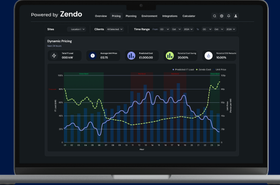When the UK government designated data centers as Critical National Infrastructure (CNI) a year ago, it was a landmark moment. Being recognized alongside energy, transport, and telecoms emphasized that data centers are engines of modern life, essential to national security, competitiveness, and prosperity.
Over the last 12 months, momentum in our sector has grown. Investment, political engagement, and public scrutiny have increased, alongside a sharper focus on skills and sustainability.
Yet designation is not an end in itself. CNI status carries responsibilities: improving resilience in the face of energy challenges, accelerating green innovation, and building trust by delivering tangible benefits for local communities. National Data Center Day is a moment to reflect on progress and assess where challenges remain.
Investment and confidence
In the past year, more than £25 billion ($34bn) has been committed to UK data center projects. Major commitments from global investors have led to multiple billion-pound campuses now under construction or in operation. Labour’s AI Action Plan, announced in January, earmarked a further £14 billion ($19bn) for data-driven infrastructure.
This confidence shows that the CNI designation has unlocked a new level of recognition. The UK is well placed to be a frontrunner in technological innovation, with techUK forecasting five to six percent annual growth in the market over the next decade. But scale alone is not enough; the sector also requires smarter builds, faster connections, and stronger integration with our energy infrastructure.
Energy and resilience
High energy costs, delays in grid connections, and transmission bottlenecks are holding projects back. These wider challenges directly constrain the pace at which new capacity can come online. Unless resolved, the UK risks losing investment to regions with more competitive markets.
Too often, projects are delayed because grid supply cannot be secured, but the sector is not only a consumer of power; it can also be part of the solution. Operators are co-investing in grid reinforcement, developing on-site power generation, and integrating renewables. Energy resilience is not just an operational requirement but a national security imperative, one where data centers can play an enabling role.
AI, data sovereignty, and skills
Meeting the standards of CNI means having more than reliable capacity. It requires data sovereignty and the skills to support it. In today’s global environment, domestic capability is a necessity if the UK is to remain competitive and secure. Other CNI sectors, such as energy and telecoms, already recognise the importance of sovereignty, and our industry must do the same.
AI is transforming industries at speed, yet the global race for capability has often drawn skills and investment overseas. Sovereign AI can only be delivered if both infrastructure and talent are rooted here. The AI Action Plan promised to grow domestic pipelines and support infrastructure. These are foundational commitments if the UK is to keep pace with global competitors.
Demand for AI engineers, data specialists, and resilient facilities already outstrips supply. Sector efforts to expand training and invest in infrastructure are encouraging, but remain small compared to the challenge. Government and industry partnership is required to meet the demand created by AI and cloud infrastructure.
Water use and sustainability
Water is one of the most sensitive issues for our sector, but misconceptions remain. Modern facilities now use closed-loop cooling systems that recycle water, reducing pressure on local supplies. Progress is also being made in reaching zero waste to landfill in operations, increasing recycled content in construction, and measuring emissions from materials through to workforce travel.
The goal is to ensure data centers can be environmentally responsible. That includes reusing heat for local housing, investing in biodiversity features such as living walls, and adopting alternative fuels like Hydrotreated Vegetable Oil (HVO) and biomethane that cut emissions compared to diesel.
Sustainability cannot be treated as an add-on. It is central to building trust and showing that data centers can integrate into their surroundings while enabling the UK’s digital future.
Community partnership
Winning public trust is vital. Communities need to see that data centers provide local benefit, not just global connectivity.
The sector is beginning to show this in practice. Examples include partnerships with local schools on STEM and apprenticeships, funding for amenities agreed through planning, opening landscaped areas for public use, and committing to local hiring and supplier programs.
Developers and operators will need to balance the needs of customers and investors while embedding features that genuinely improve local life. As more communities find data centers earmarked for local sites, demonstrating the benefits of having a DC on the doorstep, with programs delivering tangible local benefits, will be central to avoiding delays caused by NIMBYism.
Looking ahead
One year on, investment is flowing, innovation is accelerating, and awareness of our role in national life is growing. But tensions remain: older facilities with higher environmental footprints exist alongside new campuses; communities welcome digital growth but worry about local impacts; energy cost and supply require urgent attention.
Priorities for the year ahead are clear: partner with government to educate on, and resolve, the energy price problem; strengthen sovereign skills; and show that data centers can be trusted partners in local communities. Progress will depend on collaboration between operators, government, and regulators to unlock capacity and maintain trust. If achieved, CNI status will not just protect the UK’s infrastructure, it will support growth, competitiveness, and quality of life for decades to come.
More in Investment / M&A / Financing
Read the orginal article: https://www.datacenterdynamics.com/en/opinions/national-data-center-day-reflecting-on-a-year-of-cni-status/








